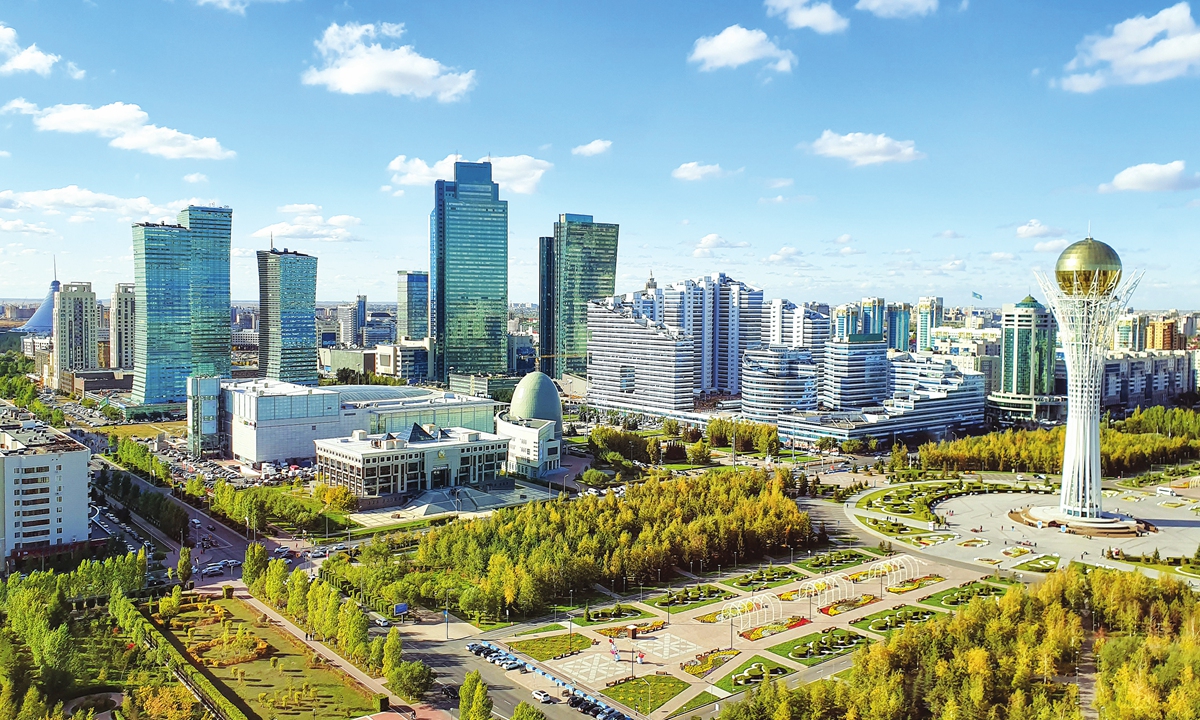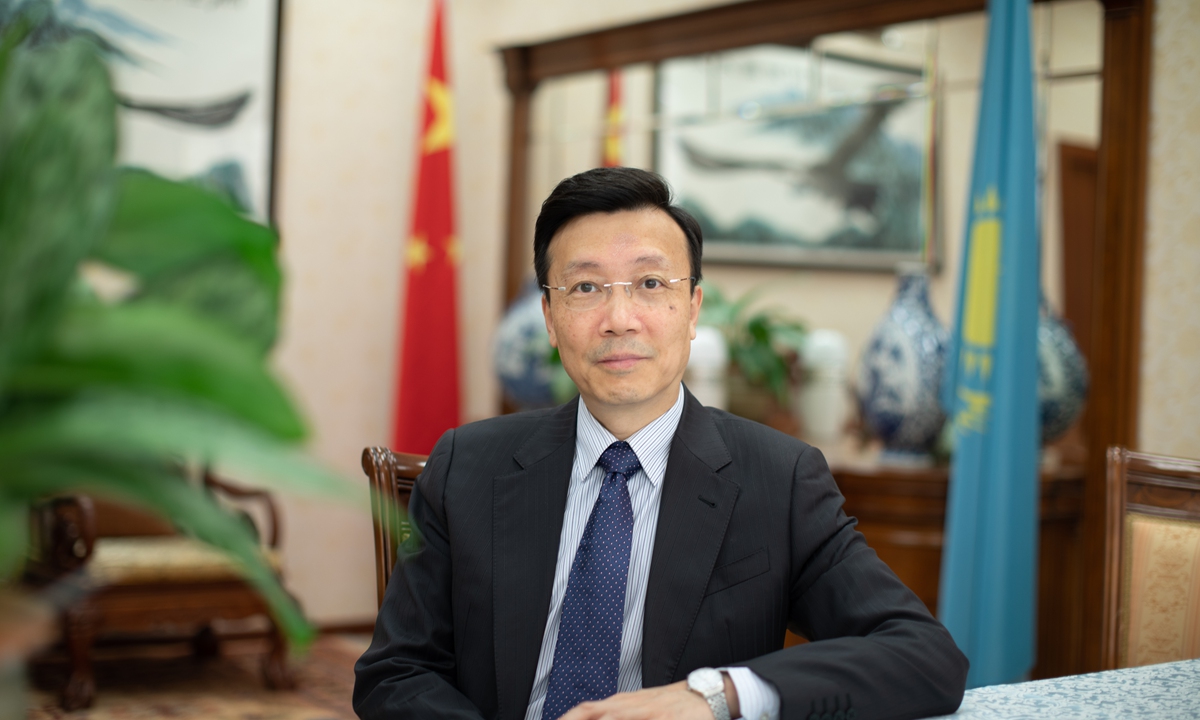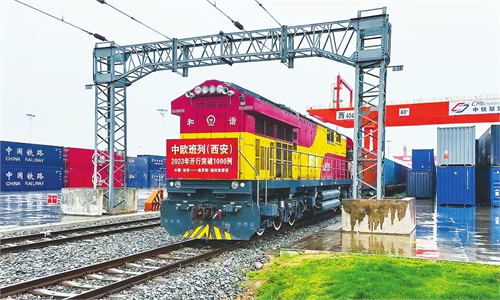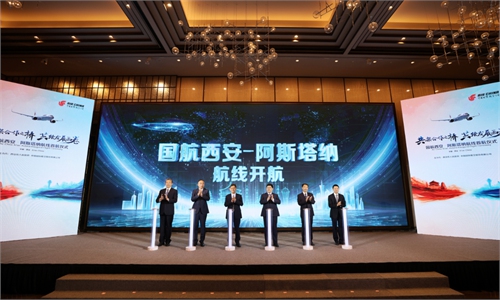China-Kazakhstan BRI cooperation a 'benchmark' that bears fruitful results: Chinese ambassador


A view of Astana, Kazakhstan Photo: VCG
Editor's Note:
With the first ever in-person summit between top leaders of China and five Central Asian countries in 31 years fast approaching, the China-Central Asia Summit is expected to open on May 18 and 19 in Xi'an, capital city of Northwest China's Shaanxi Province. At the same time, President Kassym-Jomart Tokayev of Kazakhstan is scheduled to pay a state visit to China upon invitation from Chinese President Xi Jinping.
Kazakhstan, as a pioneer partner of the China-proposed Belt and Road Initiative (BRI), holds a peculiar position. In an exclusive interview with the Global Times (GT), Chinese Ambassador to Kazakhstan Zhang Xiao (Zhang) noted that the cooperation between the two nations has emerged as a shining example and a benchmark in implementing the BRI, which is closely watched by other economies in the world.

Chinese Ambassador to Kazakhstan Zhang Xiao Photo: Courtesy of the Chinese Embassy in Kazakhstan
GT: How do you view the current China-Kazakhstan relationship? President Tokayev is to kick off a state visit to China. What are your expectations for this visit?
Zhang: China and Kazakhstan are close neighbors and good friends. Over the past 31 years since the establishment of the diplomatic relations, the ties between China and Kazakhstan have withstood the test of international changes, and have reached the highest level of a permanent comprehensive strategic partnership.
This year marks the 10th anniversary of the BRI and the beginning of another "Golden 30 Years" between China and Kazakhstan, which carries historical significance.
The development of bilateral relations faces growing new opportunities, and I believe that the visit by President Tokayev will play an important and guiding role in ensuring the success of the China-Central Asia Summit, advancing the development of the bilateral ties, and the upgrading of cooperation in various fields to achieve more progress and breakthroughs, bringing more benefits to the people of both nations.
GT: On September 7, 2013, Chinese President Xi Jinping proposed the initiative to jointly build the Silk Road Economic Belt during his speech at Nazarbayev University in Kazakhstan. Over the last decade, what achievements have China and Kazakhstan made in their cooperation under the BRI?
Zhang: In 2013, President Xi first proposed the BRI in Kazakhstan. Over the last decade, the initiative has become the world's largest platform for international cooperation. So far, China has signed cooperation documents under the BRI with 151 countries and 32 international organizations, covering two-thirds of the world's countries and regions, covering 63 percent of the world's total population.
In the last 10 years, the initiative has attracted nearly $1 trillion in investment, with more than 3,000 cooperation projects being built, creating 420,000 jobs for the participating economies and lifting 40 million people out of poverty.
Chinese customs data showed that in the first four months this year, China's imports and exports with BRI participating economies amounted to 4.61 trillion yuan, a year-on-year growth of 16 percent.
Among them, trade with Kazakhstan and other Central Asian countries grew by 37.4 percent. According to a World Bank report, by 2030, the BRI is expected to help lift 7.6 million people in the world out of extreme poverty, and 32 million people out of moderate poverty.
Kazakhstan was among the first group of countries to sign bilateral cooperation documents with China for jointly building the BRI. The cooperation between China and Kazakhstan has emerged as a shining example and benchmark in implementing the BRI, showcasing its significant demonstrative role worldwide.
As of today, China and Kazakhstan have opened seven permanent border crossings, five cross-border oil and gas pipelines, two transnational railway mainlines, and one international border cooperation center.
In addition, the China-Kazakhstan Lianyungang Logistics Base has provided Kazakhstan with an access to the Pacific Ocean. In 2022, the number of China-Europe (Central Asia) freight trains passing through the dual-port border between Northwest China's Xinjiang Uygur Autonomous Region and Kazakhstan exceeded 13,000, playing a prominent role in ensuring the stability and smooth operation of the international supply chain.
In 2022, bilateral trade between China and Kazakhstan exceeded $31 billion for the first time, with a year-on-year growth of 23.6 percent, and an increase of 26.8 percent in the first quarter of this year.
China has remained Kazakhstan's second largest trading partner, second largest export destination, and second largest source of imports for many years.
The two countries are working on strengthening financial system cooperation and expanding bilateral currency swap and settlement to provide diversified investment and financing support for their enterprises.
GT: Both China and Central Asian countries face the threats of terrorism and extremism. What form of cooperation do you think China and countries like Kazakhstan in Central Asia can carry out in their fight against terrorism and extremism?
Zhang: Safeguarding the security, stability, and development of Central Asia is the common aspiration for all countries in the region. China will continue to deepen counterterrorism cooperation with Central Asian countries through bilateral channels and multilateral platforms, such as the United Nations and the Shanghai Cooperation Organization.
GT: The situation in Ukraine is profoundly impacting the international landscape. Regarding the issue, to what extent do China and Kazakhstan share the same position? What coordinated cooperation can be carried out between the two countries?
Zhang: The Ukraine crisis has been ongoing for more than a year, and China is deeply concerned about the escalating conflict and the possibility for it to spiral out of control. Currently, rational thinking from various parties seems to grow, providing an opportunity that we should seize the chance to accumulate favorable conditions for a political resolution of the crisis.
We hope that all parties involved should reflect on the crisis and seek a long-lasting and peaceful solution for Europe through faithful dialogue.
China and Kazakhstan share identical positions on the issue and have a common understanding of the background and root causes of this crisis. China is willing to continue strengthening cooperation with Kazakhstan, calling on the international community to abandon the Cold War mentality, seek maximum consensus, and play an active role in resolving the crisis through political and diplomatic means.


